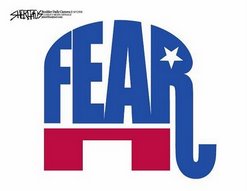Goodbye and rest in peace, my favorite contemporary author.
As a memoriam, of sorts, below is re-published poputonian's post from Digby's Hullabaloo:
"Last year, Vonnegut published another best-seller, this one called A Man Without A Country. Vonnegut's humor will make you laugh, but his fatalism will make you cry. In typical Vonnegut fashion, the points he makes throughout the book are woven together with the flair of a creative writer. The two main complaints he emphasizes are unmistakable: the senseless killing being perpetrated by America, and America's addiction to fossil fuel. America is destroying the planet, which leads Vonnegut to reject the country he once fought for.
Overall the book is about politics, government, and philosophy, but on its sweeter side it is about people and family, about community. It might well be his best work ever. At one point in the book, Vonnegut describes how children learn to be creative, or how they came to use their brains to think and imagine; no sounds, no pictures, just thinking and imagining:
We are not born with imagination. It has to be developed by teachers, by parents. There was a time when imagination was very important because it was the major source of entertainment. In 1892, if you were a seven-year-old, you'd read a story--just a very simple one--about a girl whose dog had died. Doesn't that make you want to cry? Don't you know how the little girl feels? And you'd read another story about a rich man slipping on a banana peel. Doesn't that make you want to laugh? And this imagination circuit is being built in your head. If you go to an art gallery, here's just a square with daubs of paint on it that haven't moved in hundreds of years. No sound comes out of it.
The imagination circuit is taught to respond to the most minimal of cues. A book is an arrangement of twenty-six phonetic symbols, ten numerals, and about eight punctuation marks, and people can cast their eyes over these and envision the eruption of Mount Vesuvius or the Battle of Waterloo. But it's no longer necessary for teachers and parents to build these circuits. Now there are professionally produced shows with great actors, very convincing sets, sound, music. Now there's the information highway. We don't need circuits any more than we need to know how to ride horses.
(snip) Have you ever served in a war? Have you ever been held captive? Vonnegut was an American prisoner of war, held in captivity in Dresden, Germany on February 13, 1945. That was the night the British intentionally massacred 135,000 people. Killed them all dead, in one night.
It was pure nonsense, pointless destruction. The whole city was burned down, and it was a British atrocity, not ours. They sent in night bombers, and they came in and set the whole town on fire with a new kind of incendiary bomb. And so everything organic, except my little POW group, was consumed by fire. It was a military experiment to find out if you could burn down a whole city by scattering incendiaries over it.I can sense the brain circuits of the right-wingers, or the flag conservatives, or the authoritarian followers, as they try to process Vonnegut's words: Just how courageous was he in battle? Prove it. Did he have any serious injuries, or just superficial ones? Did he have the right attitude, that of a soldier dedicated to his country? Does Vonnegut think any war is worth fighting; is the Constitution worth fighting for?
Of course, as prisoners of war, we dealt hands-on with dead Germans, digging them out of basements because they had suffocated there, and taking them to a huge funeral pyre. And I heard -- I didn't see it done -- that they gave up this procedure because it was too slow and, of course, the city was starting to smell pretty bad. And they sent in guys with flamethrowers.
Why my fellow prisoners of war and I weren't killed, I don't know.
I was a writer in 1968. I was a hack. I'd write anything to make money, you know. And what the hell, I'd seen this thing, I'd been through it, and so I was going to write a hack book about Dresden. You know, the kind that would be made into a movie where Dean Martin and Frank Sinatra and others would play us. I tried to write, but I couldn't get it right. I kept writing crap.
So I went to a friend's house -- Bernie O'Hare, who'd been my pal. And we were trying to remember funny stuff about our time as prisoners of war in Dresden, tough talk and all that, stuff that would make a nifty war movie. And his wife, Mary O'Hare, blew her stack. She said, "You were nothing but babies then."
And that is true of soldiers. They are in fact babies. They are not movies stars. They are not Duke Wayne. And realizing that was key, I was finally free to tell the truth. We were children and the subtitle of Slaughterhouse Five became The Children's Crusade.
Why had it taken me twenty-three years to write about what I had experienced in Dresden? We all came home with stories, and we all wanted to cash in, one way or another. And what Mary O'Hare was saying, in effect, was, "Why don't you tell the truth for a change?"
Ernest Hemingway wrote a story after the First World War called "A Soldier's Home" about how it was very rude to ask a soldier what he'd seen when he got back home. I think a lot of people, including me, clammed up when a civilian asked about battle, about war. It was fashionable. One of the most impressive ways to tell your war story is to refuse to tell it, you know. Civilians would then have to imagine all kinds of deeds of derring-do.
But I think the Vietnam War freed me and other writers, because it made our leadership and our motives seem so scruffy and essentially stupid. We could finally talk about something bad that we did to the worst people imaginable, the Nazis. And what I saw, what I had to report, made war look so ugly. You know, the truth can be really powerful stuff. You're not expecting it.
Of course, another reason to talk about war is that it's unspeakable.
It so happens that idealism enough for anyone is not made of perfumed pink clouds. It is the law! It is the U.S. Constitution.
But I myself feel that our country, for whose Constitution I fought in a just war, might as well have been invaded by Martians and body snatchers. Sometimes I wish it had been. What has happened instead is that it was taken over by means of the sleaziest, low-comedy, Keystone Cops-style coup d'etat imaginable.
I was once asked if I had any ideas for a really scary reality TV show. I have one reality show that would really make your hair stand on end: "C-Students from Yale."
George W. Bush has gathered around him upper-crust C-students who know no history or geography, plus not-so-closeted white supremacists, aka Christians, and plus, most frighteningly, psychopathic personalities, or PPs, the medical term for smart, personable people who have no consciences.
To say somebody is a PP is to make perfectly respectable diagnosis, like saying he or she has appendicitis or athlete's foot. The classic medical text on PPs is The Mask of Sanity by Dr. Hervey Cleckley, a clinical professor of psychiatry at the Medical College of Georgia, published in 1941. Read it!
Some people are born deaf, some are born blind or whatever, and this book is about congenitally defective human beings of a sort that is making this whole country and many other parts of the planet go completely haywire nowadays. These were people born without consciences, and suddenly they are taking charge of everything.
PPs are presentable, they know full well the suffering their actions may cause others, but they do not care. They cannot care because they are nuts. They have a screw loose!
And what syndrome better describes so many executives at Enron and WorldCom and on and on, who have enriched themselves while ruining their employees and investors and country and who still feel as pure as the driven snow, no matter what anybody may say to or about them? And they are waging a war that is making billionaires out of millionaires, and trillionaires out of billionaires, and they own television, and they bankroll George Bush, and not because he's against gay marriage.
So many of these heartless PPs now hold big jobs in our federal government, as though they were leaders instead of sick. They have taken charge. They have taken charge of communications and the schools, so we might as well be Poland under occupation.
They might have felt that taking our country into an endless war was simply something decisive to do. What has allowed so many PPs to rise so high in corporations, and now in government, is they are so decisive. They are going to do something every fuckin' day and they are not afraid. Unlike normal people, they are never filled with any doubts, for the simple reason that they don't give a fuck what happens next. Simply can't. Do this! Do that! Mobilize the reserves! Privatize the public schools! Attack Iraq! Cut health care! Tap everybody's telephone! Cut taxes on the rich! Build a trillion-dollar missile shield! Fuck habeas corpus and the Sierra Club and In these Times, and kiss my ass!"






















No comments:
Post a Comment